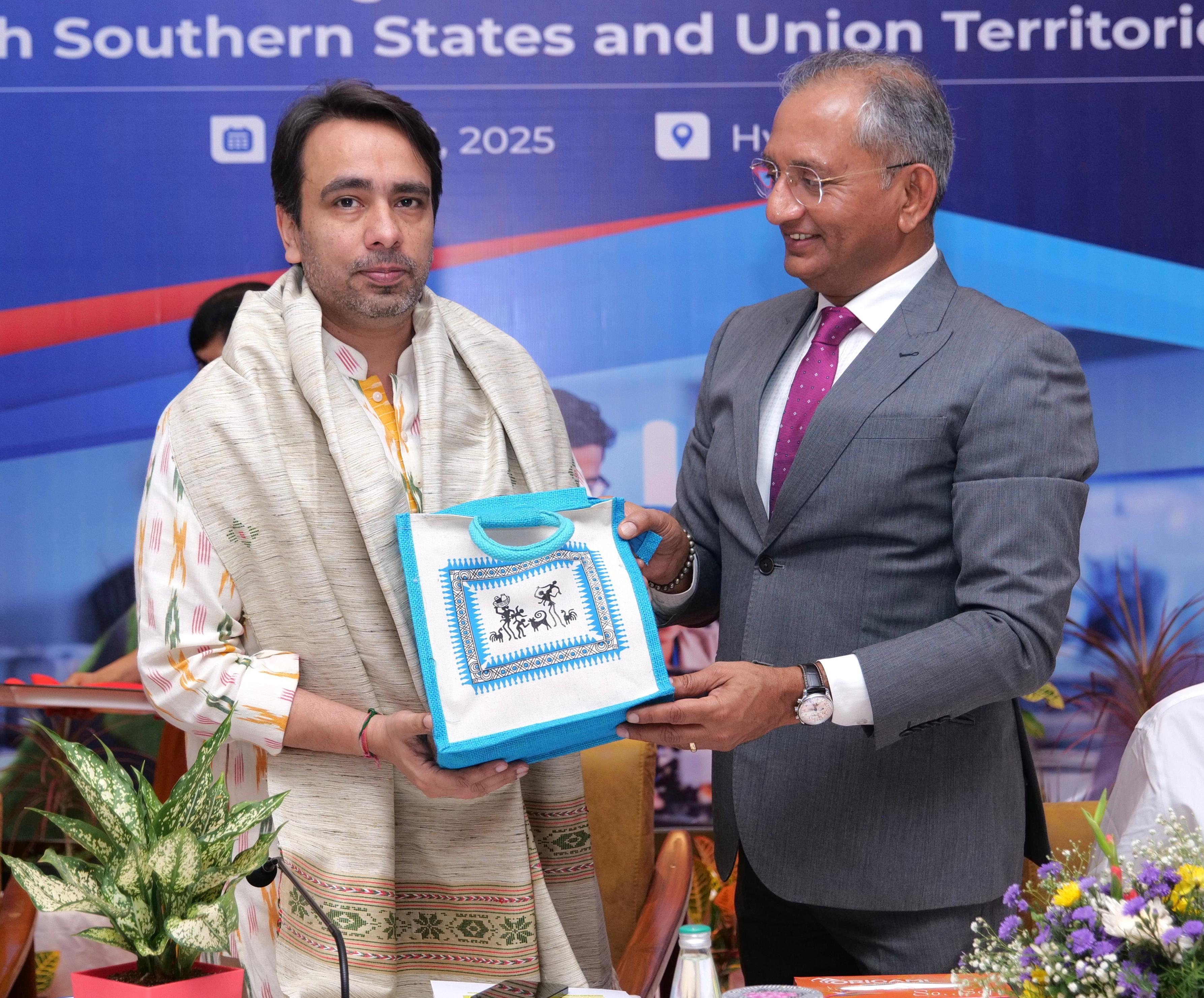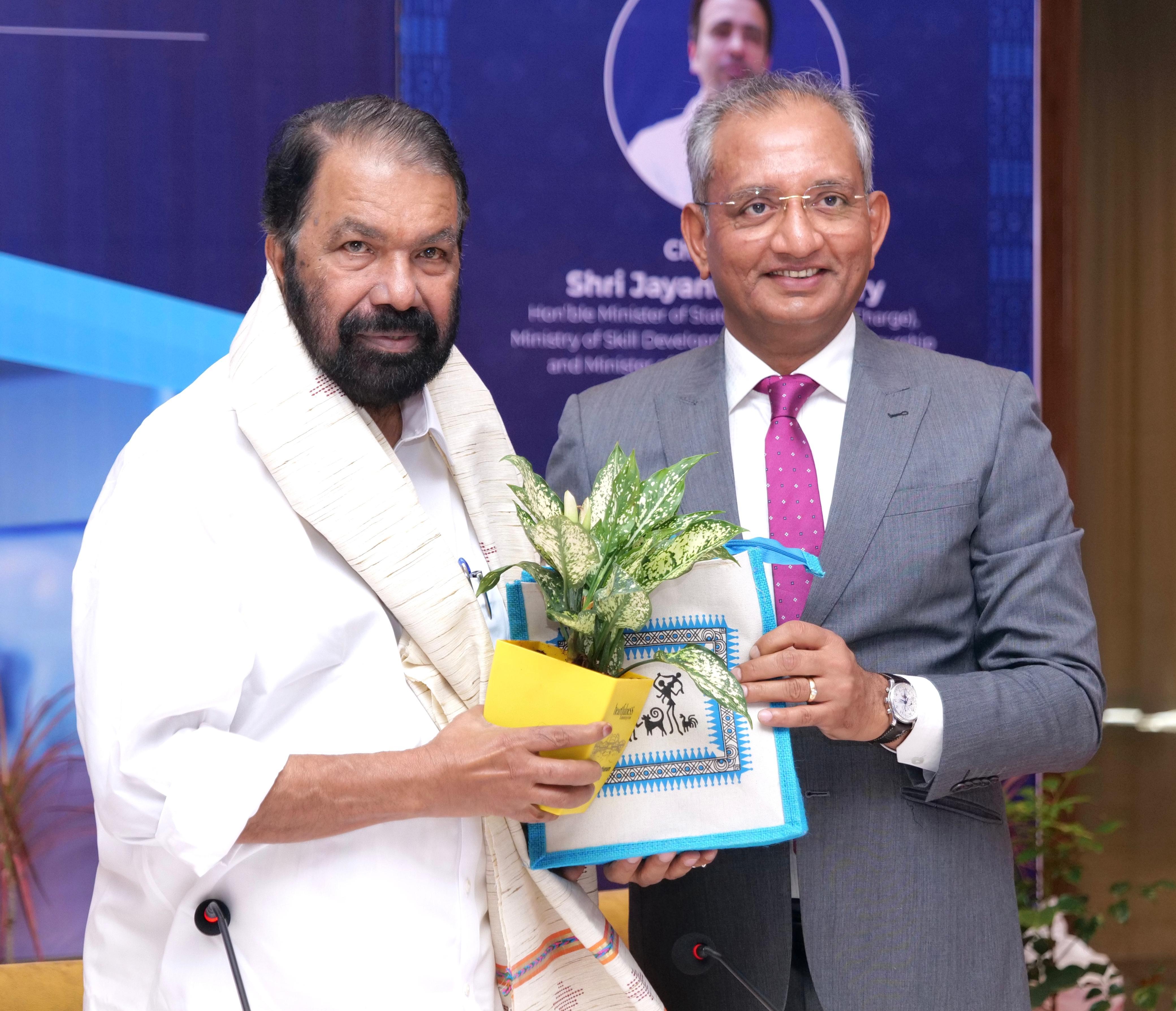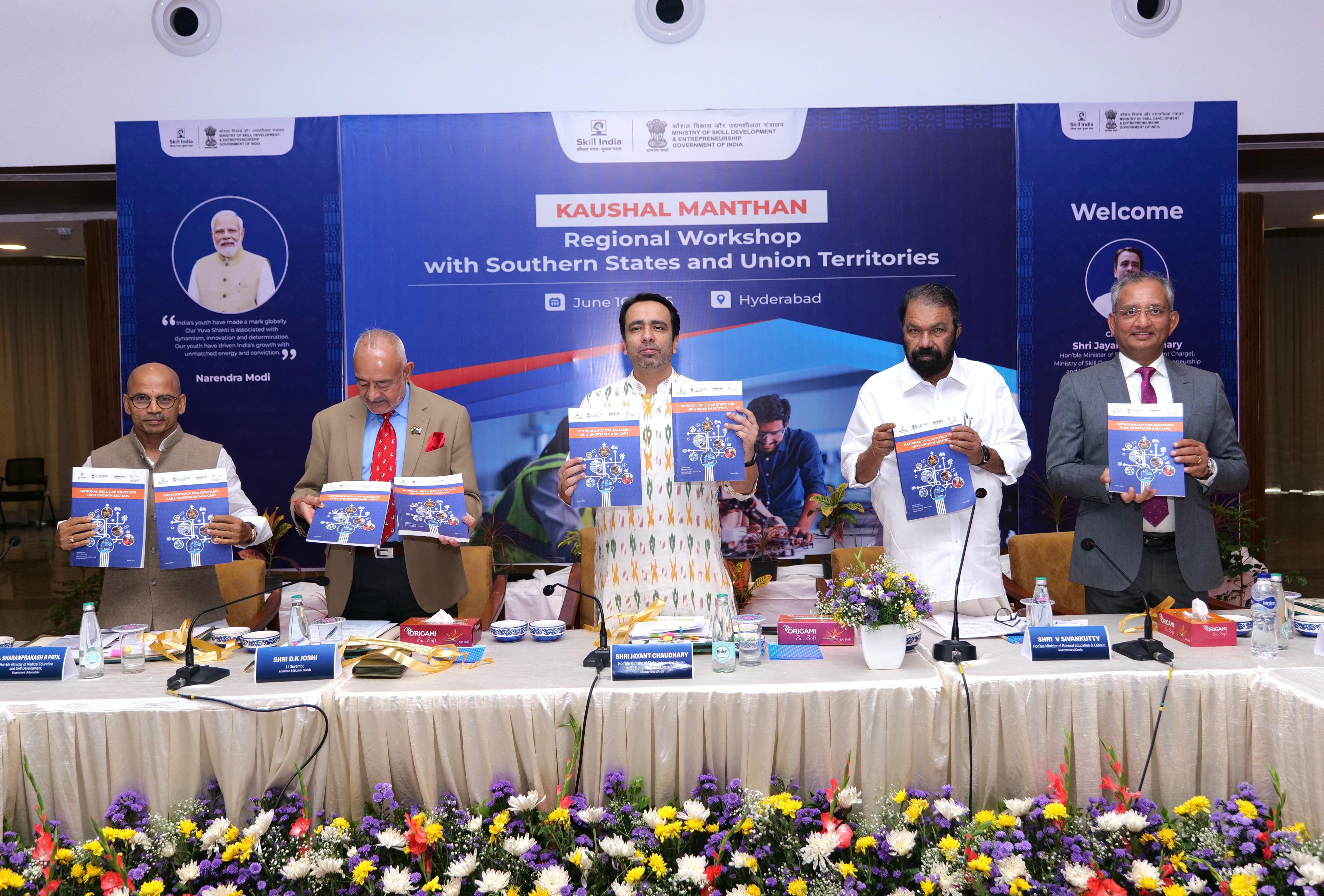“Skill Development Cannot Have Prescriptive Templates: Adaptive, Locally-Driven Models Are the Way Forward” – Union Minister Jayant Chaudhary
“Skill Development Cannot Have Prescriptive Templates: Adaptive, Locally-Driven Models Are the Way Forward” – Union Minister Jayant Chaudhary
Speaking at the Kaushal Manthan Regional Workshop organised by the Ministry of Skill Development and Entrepreneurship (MSDE) at Kanha Shanti Vanam, Hyderabad, Minister of State (Independent Charge) for Skill Development and Entrepreneurship, Shri Jayant Chaudhary called for a shift away from rigid, one-size-fits-all approaches in skilling. “Skill development cannot have prescriptive templates,” he said. “We must empower states to craft solutions that are rooted in their local economic contexts and aligned with the aspirations of their youth. Only then can we create meaningful impact and sustained transformation.”

Underscoring this vision for a more adaptive and responsive ecosystem, the Minister announced the establishment of two new Centres of Excellence—out of the five proposed nationwide—at National Skill Training Institutes (NSTIs) in Hyderabad and Chennai. These centres will serve as national reference points for high-quality instructor training and specialised skilling aligned with emerging domains.

The Minister, Shri Jayant Chaudhary underscored the imperative for states to adopt a more strategic, outcome-oriented approach to skill development—one that is deeply aligned with the aspirations of India’s youth and the evolving demands of the economy.

Recognising that quality training is only as strong as the trainers who deliver it, the Minister called for dedicated investments in faculty development—through improved institutional capacity, competitive remuneration, and rigorous pedagogical standards. He urged states to adopt a decentralised and data-driven planning framework by working closely with district collectors to develop localised skilling plans, informed by granular skill gap assessments conducted in collaboration with expert bodies like the World Bank.

The Minister firmly directed that the CITS (Craft Instructor Training Scheme) certification be made mandatory for all newly recruited instructors, particularly in newly established ITIs across states. He emphasized that this requirement is critical to ensuring high-quality, standardized instruction across the country. To uphold instructional excellence and credibility, states were urged to revise their Recruitment Rules (RR) to align with NCVT norms, thereby institutionalizing CITS as a non-negotiable qualification. Uniform enforcement of this standard, the Minister noted, is essential to maintaining parity with national skilling benchmarks and delivering consistent training outcomes across the ecosystem.

Further, the Minister proposed the establishment of a robust grading and assessment framework for state-owned ITIs, to instil a culture of accountability, quality assurance, and performance-driven outcomes. He encouraged states to leverage platforms such as DISHA meetings to sensitise elected representatives about the role of skilling in economic development and social equity. Stronger industry linkages, aspirational positioning of vocational education, and language-based training for international mobility were identified as key enablers of a globally competitive workforce. Acknowledging the time-intensive nature of investing in youth, the Minister reaffirmed that such investments yield profound, long-term dividends—not just for the individual, but for the nation’s collective progress.
Understanding the evolving landscape of high-growth sectors is essential for designing responsive skilling strategies. In this context, the Ministry of Skill Development and Entrepreneurship (MSDE), under its SANKALP scheme, commissioned the National Skill Gap Study—a comprehensive analysis conducted by the National Council for Applied Economic Research (NCAER). The objective of the study was to develop a dynamic framework for skill demand assessment and develop a methodology for conducting demand assessment at the sectoral and state level. A detailed analysis of seven high growth sectors was also undertaken as a part of the study. The report was officially launched at the Kaushal Manthan Regional Workshop by the Ministers present.
Over 27.8 lakh candidates have been trained under the Pradhan Mantri Kaushal Vikas Yojana (PMKVY) across the region since 2015, Under the Jan Shikshan Sansthan scheme, more than 4.85 lakh beneficiaries—over 85% women—have been trained. More than 10 lakh apprentices have been engaged since FY 2018-19 under the National Apprenticeship Promotion Scheme (NAPS), with a DBT disbursement of ₹215 crore in the region.
During his visit to the Biochar Center of Excellence at Kanha Shanti Vanam, the Minister of State (Independent Charge) for Skill Development and Entrepreneurship inaugurated the first Rural Entrepreneurship Training Program on Biochar. This pioneering initiative aims to equip rural youth with skills across the entire biochar value chain — from biomass conversion and soil applications to farmer outreach and product positioning. Selected candidates will be commissioned as rural entrepreneurs, with biochar units set up in their villages. Each unit is expected to generate employment for 4–8 people for up to six months annually and become self-sustaining by the second year through biochar sales and carbon credit monetization. The Minister emphasized that targeted capital support through government grants can further accelerate the scale-up of these green enterprises, driving rural livelihoods and regenerative agriculture.
The Kaushal Manthan regional workshop in Hyderabad focused on deepening Centre-State collaboration for outcome-based skilling, aligning local skill development with national priorities, and driving forward the vision of Viksit Bharat @2047. The agenda included discussions on the implementation of the National Scheme for ITI Upgradation, the operationalization of Centres of Excellence, leveraging the Skill India Digital Hub, enhancing apprenticeship adoption, and integrating skilling with education and entrepreneurship. The workshop was attended by 120+ attendees including Ministers from southern states and UTs, Principal Secretaries and Secretaries of Skill Development, Directors of Employment and Training, Regional Directors and Deputy Directors General from RDSDEs, and senior officials from MSDE including the Shri Atul Kumar Tiwari, Secretary, MSDE, and other senior advisors and technical experts from the ecosystem. Their presence reflected the strong commitment across all levels of government to make skill development more impactful, inclusive, and regionally responsive.
Voices from Leaders from the South:
Andaman & Nicobar Islands
Shri D.K. Joshi, Lt. Governor, Andaman & Nicobar Islands: “The Andaman & Nicobar Islands are poised to become a gateway to India’s maritime future. With projects like the International Container Transshipment Terminal at Great Nicobar and upcoming Greenfield airports, we are aligning infrastructure with sustainable development. These initiatives not only unlock tourism and shipping potential, but also create opportunities for skill development in logistics, hospitality, and marine entrepreneurship.”
Karnataka
Dr. Sharanprakash R. Patil, Minister of Medical Education and Skill Development, Govt. of Karnataka : “Karnataka has always been at the forefront of skilling, blending academic rigor with practical industry needs. Through our 270 ITIs and international placement programs in fields like nursing and foreign languages, we are preparing our youth not just for India, but for the world. Our Skill Councils are working hand-in-hand with industry to shape future-ready professionals.”
Kerala
Shri V. Sivankutty, Minister of General Education and Labour & Skills, Govt. of Kerala: “Kerala’s approach to skilling is rooted in quality and industry relevance. Through the Kerala Academy for Skills Excellence and support from national schemes like PMKVY and SANKALP, we’ve focused on building workforce capacity for sectors like ports and logistics. We seek continued support to further scale these efforts and ensure every trained youth finds meaningful employment.”